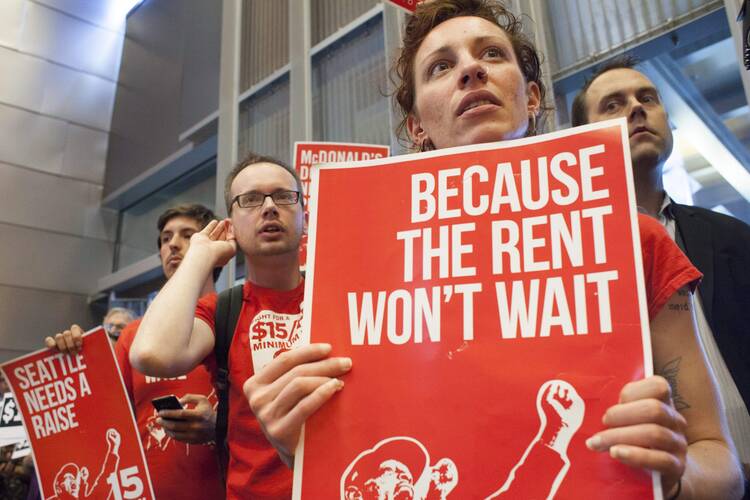St. Louis may be the latest city to adopt its own minimum-wage increase, with Mayor Francis Slay expected to propose a rate of $15 per hour. But the City Council must act quickly to beat a new state law prohibiting cities from setting their rates higher than Missouri’s (which is now at $7.65 per hour, or 40 cents above the federal minimum wage). As USA Today reports, “cities with a different one in place before Aug. 28 would be exempt.”
The USA Today story notes that Kansas City is also scrambling to beat the state law, with Mayor Sly James promising to work toward some kind of increase after “faith-based, labor and social justice groups gathered nearly 4,000 signatures on a petition toward a ballot measure raising the minimum wage to $15 by 2020.” The City Council has rejected the ballot measure, but James hopes to pass some kind of increase (not necessarily to $15) by mid-July.
Local minimum-wage laws are gaining momentum (also see Los Angeles), in part because Congress shows no signs of approving an increase at the national level. State legislatures have a mixed record on this issue, but Missouri is an example of outright hostility to the idea of adjusting minimum-wage laws to reflect local conditions, such as high housing costs in urban areas. (See “Blue President, Blue Mayors, and Red Everything Else” for more on the tensions between Republican-run states and Democratic-run cities.)
While some Democrats try to customize labor laws at the local level, presidential candidate Hillary Clinton is pushing for national uniformity on election laws. According to the New York Times, she is expected to make a speech in Texas on Thursday in which she will “condemn the Supreme Court’s 2013 ruling striking down an important provision of the Voting Rights Act, which opened the way for states to pass increasingly restrictive laws requiring voters to present government-issued photo identification at the polls, and call on Congress to re-enact parts of the law.” Reportedly, Clinton will also propose a national standard of 20 days of “early voting” before an election.
The agenda of national voting rights and municipal labor laws is a response to the increasingly messy division of political power in the U.S., in which both major parties are entrenched at different levels and show little eagerness for cooperation. Besides the jurisdictional tussle over minimum-wage laws, there’s now a fight over local gun control measures, with the National Rifle Association encouraging lawsuits against Pennsylvania cities whose laws are stricter than those at the state level. (See “Where’s the Power, the White House or the State House?” for more examples of turf warfare.)
Many Americans, of all ideological stripes, yearn for a “mandate” election that will finally motivate public officials to act in concert toward common goals. The contradictory efforts at different levels of government shows that it would take hundreds, if not thousands, of elections to send such a clear message.








